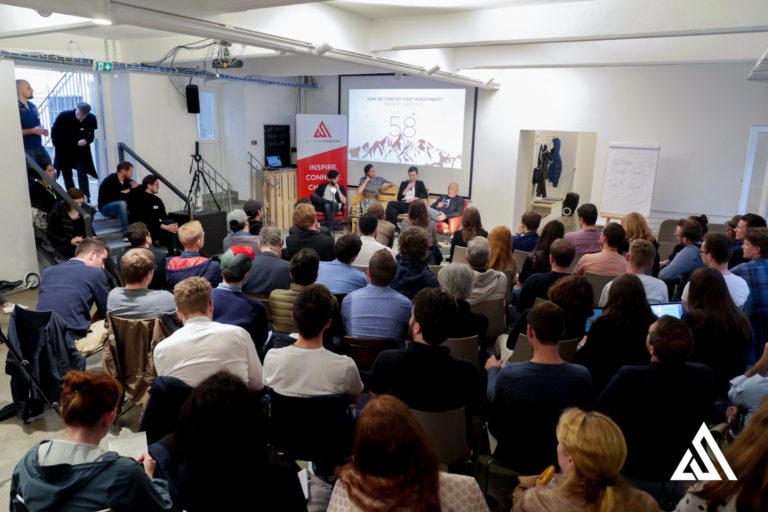Anyone who has thought of creating their own business will stumble upon one major obstacle: funding. “How do I finance my startup?” is a question founders have to ask themselves no matter if they plan to start today, tomorrow or in ten years. While it’s important to consider that many successful startups managed to finance their growth through bootstrapping (only relying on existing resources), there are just as many cases in which more money is needed from the beginning. Especially if there is a race to a market and you need to grow quickly, working with external investors makes sense. One option for getting external financing on board is through a business angel, venture capitalist or other forms of private investment.
Don’t wait for the investor to come
If you want to get an external investor on board, it’s important not to simply “take money from anybody.” There will be unforeseeable ups and downs that accompany the founding process. So, make sure that the investor by your side is someone you respect and trust.
Christoph Schnedlitz, CEO and co-founder of hiMoment recalls, “the first round of investment is the easiest and most difficult at the same time: You have to honestly show what you have to get investment, BUT you also have very little to show”. So, what can you actually put on display? Obviously, you need to show the very little you have in a very grand manner. Christoph says in order to do this convincingly: “You need a storyteller”.
Most of the time, business angels don’t take you in before you’ve proven yourself and your business idea. This means, you must have reached a so-called “pre-stage” to actually attract an investor. To use business angel Hansi Hansmann’s words, “this means that you should have proven your business model to yourself for the first 6-12 months”. However, to do so, financial resources are necessary. Here, most recommend to go for the “3 F’s” (= Friends, Family and Fools), but, you might want to look into government grants and programs like “UGP”, as well.
Finishing your first round of funding takes 6-8 months on average, according to Christoph. It’s a long process that you will want to have prepared for accordingly. You need deadlines and a, seemingly, never-ending calendar of events and people to talk to. “Know what you do, and who you need to talk to, and please keep careful track of your cap table!“
Hansi’s advice:
- Calculate how much money you need in the next 12-18 months and then derive the valuation of the company from this.
- Give away max 15-20% per round, ideally less.
Have a viable business plan and know how much funding assistance you need, in addition be able to communicate what you need the assistance for. When you meet these prerequisites, it is time to start looking for investors. Be prepared and keep in mind that “you may need to speak to hundreds of investors before you find the right one for your startup”
What they want – the power of FOMO
Hansi expects his founders to have at least 3 different pitches very well prepared: one 10-15 second version – just to get attention; another one lasting 2 minutes, and a longer one (5-7 minutes). He stresses that there’s “normally one person in the team, who is the best presenter. So, let him/her rock the stage.”
When interviewing for her Fund of Excellence, Natalia Corrales-Diez, goes through a 40-minute assessment with her applicants. This includes going through 750 criteria that calibrate to define a so-called “street fighter”. The assessment includes the participant’s vision, values and his/her “Plan B”.
There is one approach Hansi personally advises against: “Don’t ever ask an investor to give you money directly. Just pitch how great what you want to do is. Everybody knows it’s only about money, anyways.” Also, investors are very susceptible to FOMO (Fear Of Missing Out). Investors are quite insecure and don’t want to miss out on the next big thing – use this to your advantage!
hiMoment, for example, created a special newsletter to spread the “feeling that there’s really something happening”. They made sure, their marketing channel was FULL of success stories, and even developed their own language by creating a new coaching framework. Christoph says, “you need to find a language to express what it is that you’re trying to sell them and make them like it.”
The real asset is you
Having a kickass team is not sufficient, though. When it comes to money you need to fulfill certain requirements. Even having a balanced team with experienced founders, operating in big markets with a great product, clear direction and revenue does not automatically make it easy to get money. You also have to get this information to the investor AND make him/her believe in you.
For Hansi, it’s a balance of capabilities, a motivated team and at least one entrepreneur who is willing to go through a lot of frustration.
In short, be amazing! Christoph’s key to success, for example, lies in selling. He believes in “sales power” – a fire in the eyes and a vision that’s tangible.
For Natalia, the decisive factor is clearly individual: “We invest in a person. It’s only about your personality.”
Big thanks again to firestarters.space. – an architecturally impressive new co-working space in Vienna – for having us! And, big shout out to our marvelous panel Christoph Schnedlitz (Co-Founder & CEO – hiMoment), Natalia Corrales-Diez (Managing Director – Fund of Excellence), and Hansi Hansmann (Business Angel) for a diverse and thrilling discussion.
Are you currently raising money for your startup? Then join us for our next Stammtisch event, where you’ll find out everything about crowd investment!






